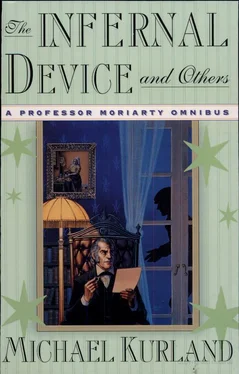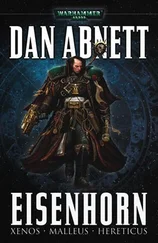"What did you find out?"
"Trepoff, calling himself Ivan Zorta, has been recruiting from the anarchist community. He has formed a secret group, which does not appear to have a name, made up of three-man cells. He has extorted strong oaths of allegiance from those he has subverted, promising them something big, something earthshaking. And soon."
"Did you see him?"
"No. Nobody has ever seen him, or so they say over the chess table. That is why I believe Zorta to be Trepoff. That and the promise of something big that he is holding out to his recruits. Also, it is all, except for Zorta himself, a little too visible. Despite all the horrible oaths and vows of secrecy, everyone in the community knows of the organization with no name. Whatever it does will surely be blamed on the anarchists, which is just what Trepoff is trying to accomplish. Now, let's look at your reports for the day."
Moriarty skimmed over the four sheets of paper Barnett had brought home filled with the day's unusual events. Apart from the mysterious bank robbery, into which Barnett decided not to delve any deeper, Barnett didn't think there was anything of particular interest.
Moriarty evidently agreed with him, as he didn't pause at any of the items until he reached the last. This he read through twice, and then he put the paper down and tapped it with his finger. "Tell me about this," he said.
"Not much to tell," Barnett said. "It looked to be a fascinating story for a while, but turned out to be nothing in the end. Luckily, all the papers picked up the correction before it got into print.
"The story got out that the Duke of Ipswich's seventeen-year-old daughter was missing under mysterious circumstances My agent, a reporter for the Standard, went out to Baddeley, the Ipswich ancestral manor in Kensington, to check on it. The butler answered the door and would not permit a reporter on the premises, but he assured my man that he was mistaken and that there was nothing wrong. My agent went to the local police station and discovered that they had indeed been called some hours before — this was early morning, so make it late last night — and were informed that Lady Catherine, the daughter, was missing. She had been entertaining a small group of friends and they had been playing a game — fish, I believe it is called — that involved much scurrying about and concealment.
"Lady Catherine went out to conceal herself, apparently, and could not be found. After an hour, her friends got worried and went around the house calling for her to come out, but she didn't. So they and the servants organized a systematic search of the mansion, from top to bottom. When they didn't find her — and by now over two hours had passed — they called in the police."
"A wise move," Moriarty noted.
"The butler informed the constable that the house had been locked for the night before Lady Catherine's disappearance. There is a patent burglar alarm on all the doors and windows, and it had been turned on. This had not been set off. So far, a first-class mystery and a first-class story, I'm sure you'll agree."
"I do," Moriarty said. "What is the denouement?"
"Well, just before my agent and the several other reporters who had appeared went racing back to their city rooms, His Grace the Duke of Ipswich arrived back at Baddeley Hall in the ducal carriage and demanded to know what was going on. When he was told that his daughter was missing, he said that on the contrary, he had taken her away himself only two hours before. The duchess, Lady Catherine's mother, is ill and in confinement at her mother's, and the duke and Lady Catherine had driven off to visit. It was a spur-of-the-moment decision of the duke's to take his daughter, and she apparently didn't bother to mention it to anyone in the house. She stayed with her mother while the duke returned home."
"And the burglar alarms?"
"He has a key."
"Of course. He would have."
Barnett shrugged. "So a first-class mystery becomes an ordinary series of misunderstandings. Luckily, the truth came out before the story was published."
"The truth," Moriarty said, "has yet to come out."
"What do you mean?"
"Life does not normally attain the qualities of a bad Restoration comedy. When you look at it from the far side of the mirror — that is, as a past event, the implausibility is less evident. But examine the story point by point, as it is supposed to have happened, and see what evolves. The Duke of Ipswich decides to visit his sick wife, who has chosen to be ill at her mother's house. On his way out he sees his daughter, who happens to be hiding from everyone else in the house, and invites her along. They leave, without seeing anyone else, whether friend, guest, or servant. Which has the duke opening and closing his own doors and turning off and resetting his own alarms. Did the duke give any reason for this extraordinary behavior?"
"No," Barnett said. "Not that I know of. Is it really that extraordinary?"
"For a duke to open his own front door? I should think so. That's the sort of naiveté that occurs in children's fairy tales. There's a knock on the castle door, and the king goes to answer it. Dukes do not open their own front doors. And if any servant had let them out, he would have mentioned it when the search for Lady Catherine began."
"So you conclude?"
"That the girl is, indeed, missing. That the Duke was notified of her absence, probably by the abductors, and was rushing back to Baddeley Hall to see if it was true. That he immediately denied her absence because he had been warned by the abductors to do so."
"Isn't that a slender thread upon which to hang such a weighty conclusion?" Barnett asked.
"It will bear the weight," Moriarty said. "I'll go further: there's at least a sporting chance that this is Trepoff's opening gambit."
"Why do you say that? What signs of Trepoff do you see?"
"None," Moriarty admitted. "But yet I see nothing to indicate that it isn't Trepoff. And my nose detects the slight odor of the bizarre that makes this one of the few events you've brought to my attention that might involve Trepoff, and therefore it warrants further investigation."
"Do you want me to get one of my free-lance men out there?"
"He would see nothing," Moriarty said. "And if you will forgive the remark, you would not see much more. Therefore, we must go together." He reached for the bell-pull on the wall behind him.
"You mean now?" Barnett asked. "By the time we get there it will be after ten."
"If I'm correct," Moriarty said, "and if the duke's daughter has indeed been abducted, then I assure you he will be awake."
Mr. Maws appeared at the door, and Moriarty told him to go out and procure a four-wheeler. "See if Clarence or Dermot are at their stand," he suggested. "After our recent experience, I am partial to the jarvey I know. At any rate, have one back here in five minutes if you can. We'll be ready to leave then."
"Very good, Professor," Mr. Maws said.
-
As the four-wheeler, with Clarence atop, proceeded toward Kensington, Moriarty sat stooped like a great hawk, his prominent chin resting on his folded hands above the ivory handle of his stick, his eyes narrowed in thought. Barnett, across from him, kept silent out of respect for the professor's thought processes and amused himself by trying to decide what was occupying Moriarty's mind as they sped across London. Was it thoughts of the unfortunate duke and his missing daughter? Speculations as to the current state of the mysterious Trepoff's plans against Britain in general and Moriarty in particular? Satisfied musing about the current whereabouts of the goods that until recently had occupied the vaults of the London & Midlands Bank? Reflections, perhaps, on his latest monograph, bound copies of which had just been delivered from the printers, entitled, Some Considerations on the Spectral Composition of Certain Interstellar Nebulosities?
Читать дальше












